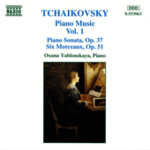
Tchaikovsky: Piano Music Vol. 1
 $25.00
Low Stock
add to cart
$25.00
Low Stock
add to cart
PYOTR Il'yich TCHAIKOVSKY
Tchaikovsky: Piano Music Vol. 1
Oxana Yablonskaya (piano)
[ Naxos / CD ]
Release Date: Tuesday 4 April 1995
Should this item be out of stock at the time of your order, we would expect to be able to supply it to you within 2 - 5 business days.
Piano works composed over a period of twenty-six years (1867-1893) comprise a by no means insignificant part of Tchaikovsky's chamber music. True, his compositions for the piano cannot claim a leading place in his musical legacy, nevertheless against the background of the post-Lisztian piano literature of Western Europe, Tchaikovsky's works for the piano are distinguished by their variety and originality. Tchaikovsky was an excellent pianist from his youth. When he graduated from law school in 1859 he played Liszt's extremely difficult fantasia on theme's from Lucia di Lammennoor, and when the Moscow Conservatory opened in 1866 he gave a brilliant performance of the overture to Ruslan and Lyudmila by Glinka in a piano transcription. His personal tastes in piano music caused Tchaikovsky to single out Robert Schumann as his favorite composer for the piano. Schumann's restless lyricism, the range of his ideas and even his exposition with its ingenious rhythms exercised a tremendous influence of Tchaikovsky. Considerable too was the influence of Chopin. On the other hand, he was indifferent to Liszt's radical reforms in piano execution, subtle, dazzling virtuosity and effervescence of design, although he had the greatest respect for Liszt as a composer. It is not difficult to trace these diverse influences in Tchaikovsky's music for the piano but, as always, they were transmuted in the crucible of his genius and bore the unmistakable stamp of his creative individuality. It is this individuality that makes Tchaikovsky's piano compositions so difficult to perform: the pianist must project himself into the images expressed in the music before he can reveal the profound essence that is sometimes concealed behind some simple salon dance or elegant concert showpiece.
Tchaikovsky composed only two works he labelled "Sonata" and both were for solo piano. The first, in C sharp minor, Opus 80, was one of his earliest works of any kind, composed in 1865. Tchaikovsky considered this sonata a student work and withheld it from publication. The rather late opus number was affixed at the time of the posthumous publication in 1900. Tchaikovsky's second sonata was begun on 13th March, 1878, a few days before he started work on his celebrated Violin Concerto. Tchaikovsky completed the work on 7th August of that year and the work was first performed in Moscow by Nikolay Rubinstein on 2nd November, 1879.
Note: Back page of booklet has small marking in felt pen
Tracks:
Grand Sonata in G Major, Op. 37
6 Morceaux, Op. 51
Nathalie-valse